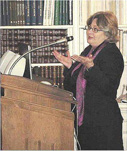Rights advocate works for scientists
March - April, 2009 | Volume 8, Issue 2
 Carol Corillon of the Committee
Carol Corillon of the Committee
on Human Rights discusses the
plight of about 70 scientists
imprisoned around the world.There are about 70 cases of scientists imprisoned for their work or beliefs around the world, and a prestigious group is working quietly on their behalf.
It is the Committee on Human Rights, a 33-year-old organization supported by the National Academy of Science, the Institute of Medicine and the National Academy of Engineering, whose director, Carol Corillon, also heads the International Human Rights Network, consisting of science academies around the world.
Developed in 1976 to free well-known Soviet dissidents such as Andrei Sakharov, the problem has not eased, she said. "It just shifts geographically."
When a case of a scientific prisoner arises, the Committee investigates and, if the person has not advocated violence, Corillon may whip up a campaign of letters from Nobel laureates, arrange visits to the incarcerated and try to pressure the foreign government.
She says she prefers to work "primarily in private, behind the scenes with heavy hitters from international science." While the National Academies provide support, Corillon said it takes another $200,000 a year in donations to meet the needs of the prisoners of conscience.
For more information, visit http://tinyurl.com/ddjmd2
To view Adobe PDF files,
download current, free accessible plug-ins from Adobe's website.